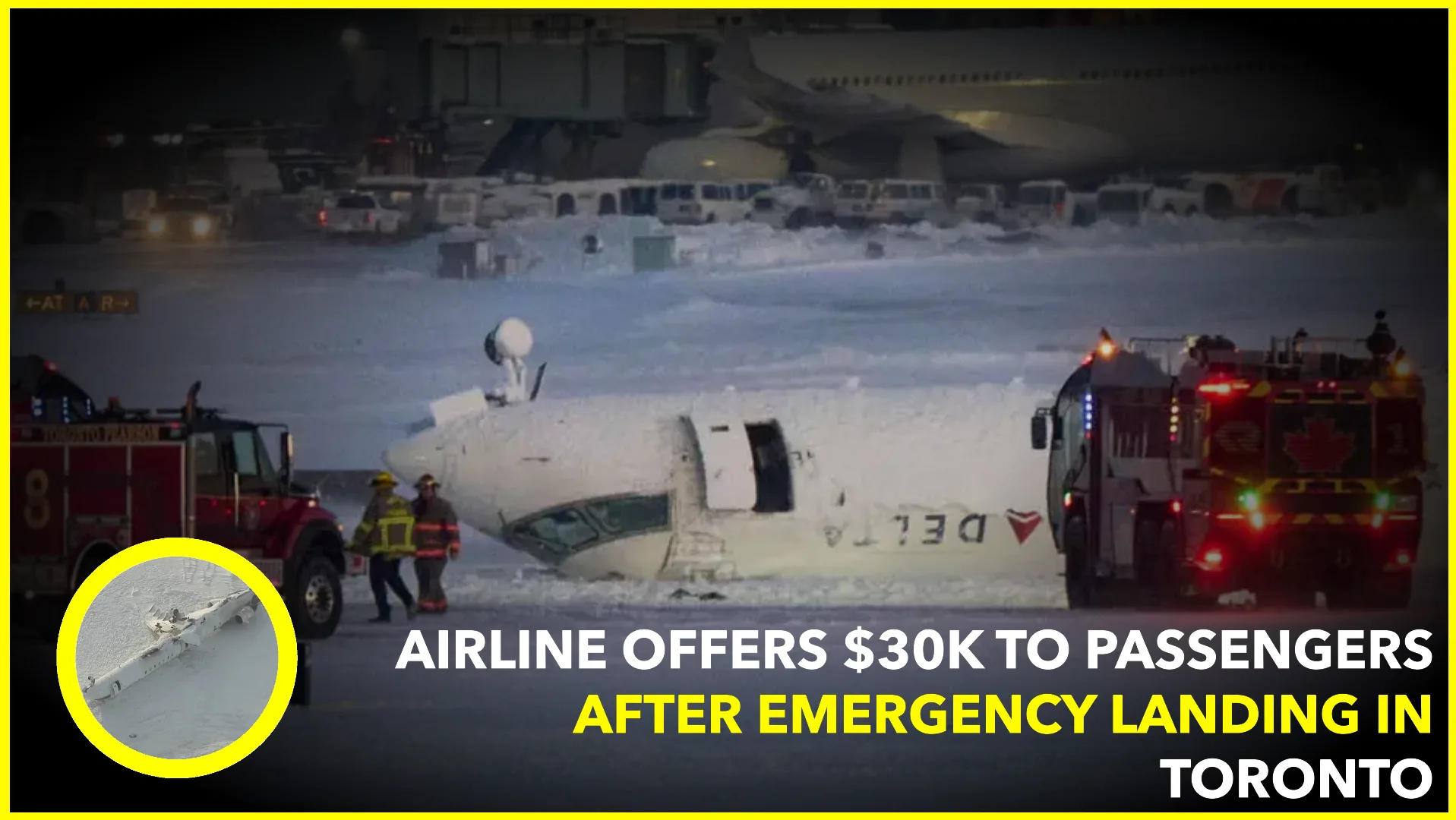Delta Air Lines has announced a compensation package of $30,000 for each passenger aboard Flight 4819, which experienced a harrowing crash landing at Toronto’s Pearson International Airport earlier this week. The incident, which occurred on February 17, 2025, involved a Bombardier CRJ 900 aircraft operated by Endeavor Air, a regional subsidiary of Delta. The plane, en route from Minneapolis, encountered severe weather conditions upon landing, resulting in a dramatic sequence where it skidded on the icy runway, flipped upside down, and ignited a fire. Miraculously, all 76 passengers and four crew members survived the ordeal.
The Incident Unfolded
As Flight 4819 approached Toronto, the region was grappling with unprecedented snowfall, leading to treacherous runway conditions. Upon touchdown, the aircraft struggled to maintain traction, causing it to veer off course. Eyewitness accounts and video footage captured the terrifying moments as the plane’s wing scraped the ground, leading to a fuel leak and subsequent fire. The aircraft ultimately came to a halt inverted, enveloped in smoke and flames.
Emergency response teams at Pearson International Airport acted swiftly. Firefighters doused the flames while rescue personnel assisted passengers in evacuating the overturned plane. Despite the severity of the crash, injuries were remarkably minimal. Reports indicate that 21 individuals were transported to local hospitals for treatment, with 20 subsequently released shortly thereafter. The rapid and efficient response of both the flight crew and emergency services has been widely praised for preventing a potential catastrophe.
Delta’s Response
In the aftermath of the incident, Delta Air Lines moved quickly to address the needs and concerns of the affected passengers. The airline’s CEO, Ed Bastian, expressed profound relief that there were no fatalities and commended the crew’s professionalism during the crisis. Recognizing the traumatic experience endured by those on board, Delta offered each passenger a $30,000 compensation package. A spokesperson for the airline emphasized that this gesture comes with “no strings attached” and does not impede passengers’ rights to pursue further legal action if they choose. This approach underscores Delta’s commitment to passenger welfare and corporate accountability.
Legal experts have weighed in on the compensation offer, noting that such gestures, while generous, are strategic moves by airlines to maintain public trust and mitigate potential litigation. Passengers are advised to consult with legal counsel to fully understand their rights and any implications of accepting the compensation. It’s important to note that under U.S. law, such compensatory payments are generally non-taxable, providing some financial relief without additional tax burdens.
Ongoing Investigations
The Transportation Safety Board of Canada has launched a comprehensive investigation into the crash. Preliminary assessments suggest that the severe weather conditions, particularly the icy runway, played a significant role in the accident. However, investigators are also examining other potential factors, including mechanical issues and human error. The aircraft’s black boxes have been recovered and are expected to provide critical data to piece together the exact sequence of events leading up to the crash.
Toronto Pearson International Airport’s President and CEO, Deborah Flint, addressed the incident, highlighting the unusual and challenging weather conditions at the time. While refraining from speculating on the precise cause, she assured the public of the airport’s full cooperation with investigative authorities and a commitment to reviewing and enhancing safety protocols as necessary.
Historical Context
This incident brings to mind previous aviation accidents where airlines have offered immediate compensation to affected passengers. Notably, in 2009, US Airways provided $5,000 to each passenger following the “Miracle on the Hudson,” where a flight made an emergency landing on the Hudson River in New York City. More recently, in 2024, Singapore Airlines extended compensatory offers after a turbulence incident resulted in passenger injuries. These precedents reflect a broader industry practice of proactive compensation to address passenger distress and uphold corporate responsibility.
Looking Ahead
As the investigation into Flight 4819’s crash landing continues, Delta Air Lines has pledged full cooperation with authorities and a thorough internal review to prevent similar incidents in the future. The airline is also providing ongoing support to passengers, assisting with medical needs, travel arrangements, and counseling services. This incident serves as a stark reminder of the unpredictable challenges in aviation and the paramount importance of safety and preparedness in ensuring passenger well-being.










